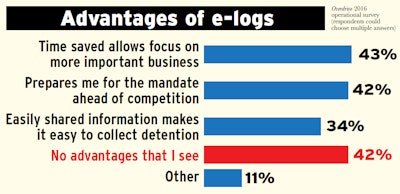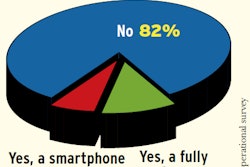Click on this link to return to the anchor piece in this series.
 Michigan-based Jake (pictured) and Christy Taylor operate the JJ&T Trucking nine-truck fleet is contracted to FedEx Ground.
Michigan-based Jake (pictured) and Christy Taylor operate the JJ&T Trucking nine-truck fleet is contracted to FedEx Ground.The biggest ELD hurdle for nine-truck JJ&T Trucking, says Jake Taylor, company co-owner with his wife, Christy, was less operational than technical. Learning the system that the Munith, Michigan-based fleet adopted three years ago when FedEx Ground required it of contractors, he says, presented a comfort-level issue for drivers and the back office. Ultimately, however, he describes it as simple and “not a big deal.”
Drivers, including Taylor, learned quickly how to interact with the ISE Fleet Services eFleetSuite dedicated e-log units ($575, $24 monthly for a one-truck owner-operator), he adds. His regional operation didn’t suffer the kind of issues reported by Rico Muhammad and Chuck Shaffer.
“We basically stick to Toledo (Ohio) and Chicago” as outbound destinations, in addition to hauling within Michigan. Because most drivers get home daily, six of the nine power units are daycabs. With so many dedicated runs, drivers got into an e-log routine similar to what they’d been doing on paper, Taylor says, well knowing “where it works best for them to take their break.”
 Among other benefits were reports of “no more interrogations at the scale house” with e-log use, in the words of one commenter. Others lauded time saved and positive operational impacts, including keeping “dispatchers honest,” forcing them and operators themselves to plan better runs. Many saw either no net benefit or a safety negative in electronic logs, combined with setbacks in trip planning and back-office operations. One owner-operator reported: “I used to drive very conservative to get good mpg. Now I’m driving faster and driving in more dangerous conditions,” given the pressure to complete tasks within rigid hours constraints.
Among other benefits were reports of “no more interrogations at the scale house” with e-log use, in the words of one commenter. Others lauded time saved and positive operational impacts, including keeping “dispatchers honest,” forcing them and operators themselves to plan better runs. Many saw either no net benefit or a safety negative in electronic logs, combined with setbacks in trip planning and back-office operations. One owner-operator reported: “I used to drive very conservative to get good mpg. Now I’m driving faster and driving in more dangerous conditions,” given the pressure to complete tasks within rigid hours constraints.The ISE system allows managers a window into operators’ progress, showing hours available and a lookback on the run in a map view. With much of the operation on the road overnight, it’s helped assure Taylor “that everything is running smoothly.”

With his operator hat on, Taylor says the biggest advantage is time saved. “We get started during the day, and we just log on. At the end of the day, we log off, and we’re done.” No more filling out, reviewing and turning in logs.
That extends to the back office. As a FedEx contractor on paper logs, JJ&T was required to pass them up the compliance chain. Now, everything happens electronically, with little direct involvement from the Taylors. “You don’t have to double-check drivers’ logs before turning them in,” a formerly time-consuming process, Taylor says.










